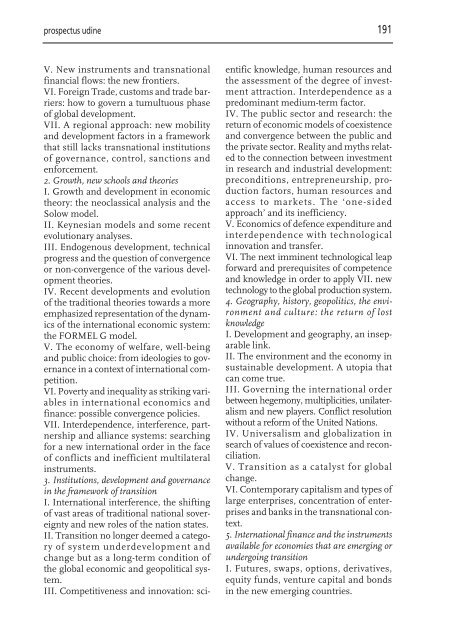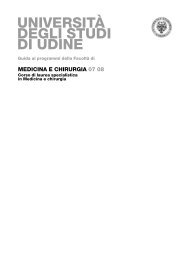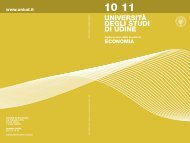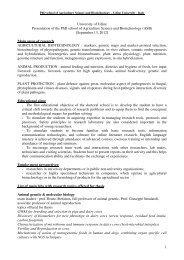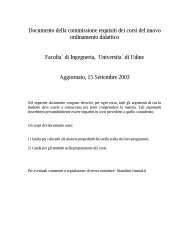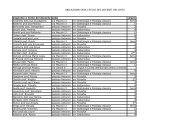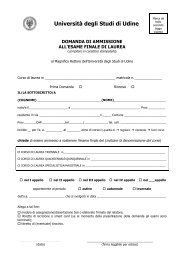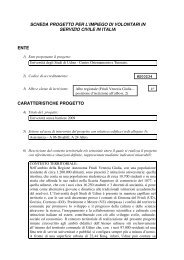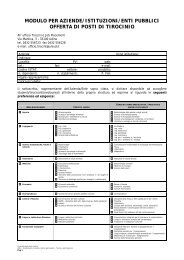â¢GUIDA ECONOMIA 07-08 - Università degli studi di Udine
â¢GUIDA ECONOMIA 07-08 - Università degli studi di Udine
â¢GUIDA ECONOMIA 07-08 - Università degli studi di Udine
You also want an ePaper? Increase the reach of your titles
YUMPU automatically turns print PDFs into web optimized ePapers that Google loves.
prospectus u<strong>di</strong>ne<br />
191<br />
V. New instruments and transnational<br />
financial flows: the new frontiers.<br />
VI. Foreign Trade, customs and trade barriers:<br />
how to govern a tumultuous phase<br />
of global development.<br />
VII. A regional approach: new mobility<br />
and development factors in a framework<br />
that still lacks transnational institutions<br />
of governance, control, sanctions and<br />
enforcement.<br />
2. Growth, new schools and theories<br />
I. Growth and development in economic<br />
theory: the neoclassical analysis and the<br />
Solow model.<br />
II. Keynesian models and some recent<br />
evolutionary analyses.<br />
III. Endogenous development, technical<br />
progress and the question of convergence<br />
or non-convergence of the various development<br />
theories.<br />
IV. Recent developments and evolution<br />
of the tra<strong>di</strong>tional theories towards a more<br />
emphasized representation of the dynamics<br />
of the international economic system:<br />
the FORMEL G model.<br />
V. The economy of welfare, well-being<br />
and public choice: from ideologies to governance<br />
in a context of international competition.<br />
VI. Poverty and inequality as striking variables<br />
in international economics and<br />
finance: possible convergence policies.<br />
VII. Interdependence, interference, partnership<br />
and alliance systems: searching<br />
for a new international order in the face<br />
of conflicts and inefficient multilateral<br />
instruments.<br />
3. Institutions, development and governance<br />
in the framework of transition<br />
I. International interference, the shifting<br />
of vast areas of tra<strong>di</strong>tional national sovereignty<br />
and new roles of the nation states.<br />
II. Transition no longer deemed a category<br />
of system underdevelopment and<br />
change but as a long-term con<strong>di</strong>tion of<br />
the global economic and geopolitical system.<br />
III. Competitiveness and innovation: scientific<br />
knowledge, human resources and<br />
the assessment of the degree of investment<br />
attraction. Interdependence as a<br />
predominant me<strong>di</strong>um-term factor.<br />
IV. The public sector and research: the<br />
return of economic models of coexistence<br />
and convergence between the public and<br />
the private sector. Reality and myths related<br />
to the connection between investment<br />
in research and industrial development:<br />
precon<strong>di</strong>tions, entrepreneurship, production<br />
factors, human resources and<br />
access to markets. The ‘one-sided<br />
approach’ and its inefficiency.<br />
V. Economics of defence expen<strong>di</strong>ture and<br />
interdependence with technological<br />
innovation and transfer.<br />
VI. The next imminent technological leap<br />
forward and prerequisites of competence<br />
and knowledge in order to apply VII. new<br />
technology to the global production system.<br />
4. Geography, history, geopolitics, the environment<br />
and culture: the return of lost<br />
knowledge<br />
I. Development and geography, an inseparable<br />
link.<br />
II. The environment and the economy in<br />
sustainable development. A utopia that<br />
can come true.<br />
III. Governing the international order<br />
between hegemony, multiplicities, unilateralism<br />
and new players. Conflict resolution<br />
without a reform of the United Nations.<br />
IV. Universalism and globalization in<br />
search of values of coexistence and reconciliation.<br />
V. Transition as a catalyst for global<br />
change.<br />
VI. Contemporary capitalism and types of<br />
large enterprises, concentration of enterprises<br />
and banks in the transnational context.<br />
5. International finance and the instruments<br />
available for economies that are emerging or<br />
undergoing transition<br />
I. Futures, swaps, options, derivatives,<br />
equity funds, venture capital and bonds<br />
in the new emerging countries.


